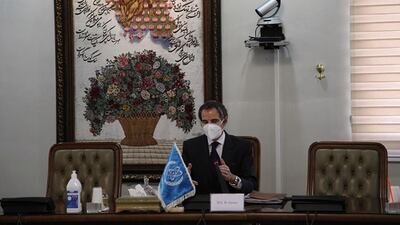Iran is producing highly enriched uranium faster than law allows, a report by the UN nuclear watchdog said on Tuesday.
The law started the process of enriching to 20 per cent fissile purity last month.
As part of a recent acceleration of breaches of its 2015 nuclear deal with major powers, Iran has begun refining uranium to 20 per cent at Fordow, a site built secretly inside a mountain, although the deal says Iran cannot enrich at all inside the facilities.
Until last month, Iran had not enriched beyond 4.5 per cent purity, above the deal's limit of 3.67 per cent but still far below the 20 per cent it achieved before the deal or the 90 per cent weapons-grade.
Uranium is considered highly enriched if it reaches 20 per cent.
"They are producing 15 kilograms a month of uranium enriched to 20 per cent. That is their production rate," a senior diplomat said.
The US again on Tuesday urged Iran to co-operate with the International Atomic Energy Agency, saying Tehran is moving further away from compliance, State Department spokesman Ned Price said.
Mr Price said Washington would be in close consultation with the UN nuclear watchdog to discuss appropriate action in support of its dealings with Tehran.
Recent legislation that required Iran to start enriching to 20 per cent stipulated that at least 120kg of uranium refined to that level be produced each year, which amounts to 10kg a month.
A second diplomat said Iran was "slightly above" the target of 10kg a month.
The agency and Iran announced on Sunday that although Tehran would go ahead with reducing co-operation with the IAEA this week, including ending snap inspections, they struck a deal on continuing "necessary" agency monitoring and verification in Iran.
Details of the deal are confidential but the agency's director general, Rafael Grossi, described a black box-type system in which data is collected without the body being able to obtain access immediately.
"This is a system that allows us to continue to monitor and to register all the key activities that are taking place throughout this period so that at the end of it, we can recover all this information," Mr Grossi told an event hosted by the US Nuclear Threat Initiative think tank.
A senior diplomat later said this system did not apply to the core monitoring of Iran's most important declared plants, such its enrichment sites, which predate Iran's 2015 nuclear deal with major powers.
But it would apply to measures added under the deal, such as devices that measure enriched uranium in real time.
"On the declared facilities, the reduction [in access] is practically negligible," the senior diplomat said.
Mr Grossi has said he hopes a deal can be struck at a higher level while his technical accord is in place, in an apparent reference to efforts to salvage the 2015 nuclear pact by ending Iranian breaches and bringing the US back into it.
"Some say at the end of it, if Iran wants and there is no agreement, they will destroy this information," he said.
"Yes, but if at the end of it there is no agreement, everything is destroyed. There is no confidence any more."
Mr Grossi said that without his weekend deal, "the situation would not, I repeat, would not be reversible or recoverable.
"We would be basically flying blind, without any idea of what would be taking place in terms of enrichment activities and other relevant activities."
A quarterly report on Iran's nuclear activities by the UN nuclear watchdog on Tuesday said that as of February 16, Iran had produced 17.6kg of uranium enriched up to 20 per cent, with the next level down being enriched between 2 and 5 per cent.
Iran's overall stockpile of enriched uranium grew by 524.9kg to 2,967.8kg during the quarter, far above the 2015 deal's 202.8kg stockpile limit, although still a fraction of the more than 8 tonnes Iran had before the deal.

